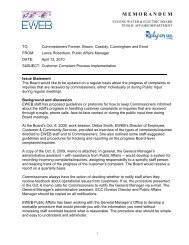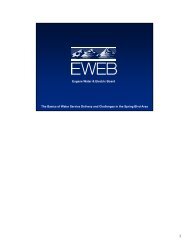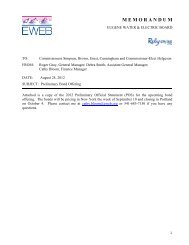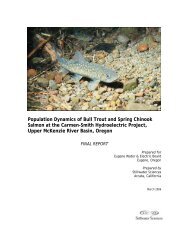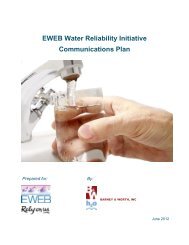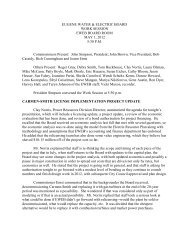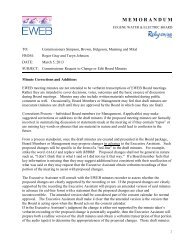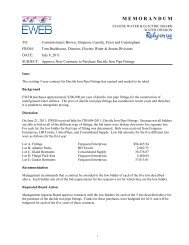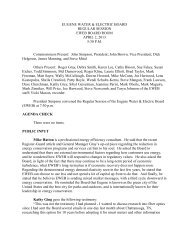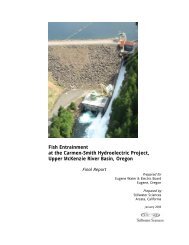You also want an ePaper? Increase the reach of your titles
YUMPU automatically turns print PDFs into web optimized ePapers that Google loves.
EUGENE WATER & ELECTRIC BOARD<br />
REGULAR SESSION<br />
EWEB BOARD ROOM<br />
APRIL 16, 2013<br />
5:30 P.M.<br />
Commissioners Present: John Simpson, President; Dick Helgeson, James Manning, and<br />
Steve Mital<br />
Others Present: Roger Gray, Debra Smith, Sibyl Geiselman, Jason Heuser, Roger Kline,<br />
Erin Erben, Steve Newcomb, Dave Churchman, Tom Williams, Wendi Schultz-Kerns, Kathy<br />
Grey, Frank Lawson, Mark Freeman, Sue Fahey, Matt Sayre, Kevin Biersdorff, Jeannine Parisi,<br />
Tim Odell, Julie Bivens, Will Price, Lisa, Atkin, Dan Morehouse, Lori Price, Anne Kah, and<br />
Taryn Johnson of the EWEB staff; Vicki Maxon, recorder.<br />
President Simpson convened the Regular Session of the <strong>Eugene</strong> <strong>Water</strong> & <strong>Electric</strong> <strong>Board</strong><br />
(EWEB) at 5:43 p.m.<br />
AGENDA CHECK<br />
President Simpson stated that item #4 has been pulled from the agenda.<br />
ITEMS FROM BOARD MEMBERS<br />
Commissioner Helgeson appreciated staff for the clarity of the backgrounder provided for<br />
tonight‘s meeting.<br />
He stated that he continues to attend the McKenzie <strong>Water</strong>shed Council meetings and<br />
recently heard an interesting presentation from Metro Wastewater Management Commission<br />
(MWMC) staff on their plans to deal with issues regarding discharge in the Willamette River,<br />
which included a component for water waste. He added that if <strong>Board</strong> or staff wanted follow-up<br />
on this, he would be happy to connect them with the person who gave the presentation.<br />
Commissioner Mital noted that on Saturday, April 20, EWEB and other community<br />
partners will be celebrating Earth Day at the EWEB plaza, and that the winner of this year‘s<br />
Green Power grant will be announced at 3:00 p.m.<br />
President Simpson stated that he presented energy efficiency awards to the MWMC via<br />
representatives of the <strong>Eugene</strong> and Springfield City Councils, for significant energy savings at<br />
their water treatment plant.<br />
President Simpson stated that he sits on the Lane Council of Governments (LCOG)<br />
<strong>Board</strong>, executive committee and budget committee, and that LCOG‘s budget is now up for<br />
approval. He said that when LCOG‘s new director came into her position, there was a $1.3<br />
million budget shortage, and that after ―turning over every rock,‖ she has now lowered this
Regular Session<br />
April 16, 2013<br />
Page 2 of 18<br />
shortage to $45,000. He said this is a fantastic testament to her capability as a leader, and that he<br />
is proud to be a part of that organization.<br />
PUBLIC INPUT<br />
Tim Bennett is a resident of the Friendly Neighborhood, and a retired Safety &<br />
Occupational Health professional with the federal government. He presented the following<br />
testimony:<br />
―Unlike the residents who live around the reservoir, my water source is the reservoir.<br />
Only people who live 90 feet below the reservoir get their water from it. Those who live in<br />
proximity of the reservoir get their water from the water tower next to the reservoir. The safety<br />
of their water is not at risk. Theirs is strictly a recreational use, and I hope the <strong>Board</strong> will weigh<br />
their input accordingly.<br />
As a safety professional, I used risk management as a tool to come up with the safest way<br />
of doing things. One of the early steps in the process is to eliminate known risk, if possible, and<br />
mitigate ones you can‘t. You cannot eliminate all the contaminants to the water, but you can<br />
eliminate one source of contaminant by closing off the reservoir, thus protecting the safety of<br />
drinking water that thousands of residents and schools use. Why would you want to increase the<br />
risk to our drinking water for someone‘s recreation?<br />
There are parks close by that residents can use, such as Washington Park four blocks<br />
away, Adams Elementary School seven blocks away, Friendly Park six blocks away, Frances<br />
Willard Elementary School three blocks away, and a suede park that the locals call Madison<br />
Meadows, three blocks away.<br />
The Federal Safe Drinking <strong>Water</strong> Act‘s strategy is to strengthen public health protection<br />
from contaminants in drinking water. As a safety professional, I‘ve dealt with situations where<br />
contaminants have been within legal ranges but still made workers sick because of the workers‘<br />
sensitivity. Older residents and children can be more sensitive to contaminants than other<br />
individuals. If the water ever became tainted with bacteria, the proximity of four elementary<br />
schools would cause a large number of children to be exposed.<br />
Just this past weekend, vandals tore the gate off the reservoir. Don‘t wait for them to do<br />
more damage. Please secure the reservoir now.‖<br />
Bob Cassidy told the <strong>Board</strong> that he is very impressed with the way the new <strong>Board</strong> is<br />
functioning, and he told them that this <strong>Board</strong> feels much better to him than when he sat on the<br />
<strong>Board</strong>. Regarding a portion of his testimony at a previous <strong>Board</strong> meeting, he confirmed that<br />
what he meant to say was that he wants to the <strong>Board</strong> to think about the advantage of borrowing<br />
money when rates are low and repaying it at a lesser amount. He closed by saying that he is very<br />
interested in the <strong>Board</strong> addressing the sale of real property, and that the City Council is also<br />
looking at selling assets.
Regular Session<br />
April 16, 2013<br />
Page 3 of 18<br />
Amanda Wiebush is a resident of the Whiteaker neighborhood and a graduate student at<br />
the University of Oregon, who supports a carbon tax. She said she understands EWEB‘s support<br />
for immediate action on climate change, and she believes a carbon tax is the best solution to<br />
achieving this goal. She noted that a carbon tax could influence an increase in the price of fossil<br />
fuels in order to make the price of renewable energy look better in comparison; and that <strong>Eugene</strong><br />
has a high level of fossil fuel emissions. She believes that moving toward an electrified<br />
transportation system would also create more use for EWEB‘s green power. She asked the<br />
<strong>Board</strong> to do some research on how to make the tax revenue neutral so it doesn‘t harm customers<br />
who need to pay their bills, and she added that by placing the tax, it would account for external<br />
costs which are getting high with the increased risk from storms and floods. She urged the <strong>Board</strong><br />
to support the carbon tax.<br />
Manly Norris is a graduate student at the U of O studying leadership in sustainability,<br />
who supports climate change legislation. He said that many Oregon corporations have already<br />
urged Congress to combat climate change, and that he appreciates that EWEB has sustainable<br />
policies and practices in the course of their business and that they are prepared. He believes that<br />
EWEB making a public announcement in support of a carbon tax will add a powerful voice in<br />
Salem to ask for change that couldn‘t come any sooner.<br />
Jerry Oltion thanked EWEB for keeping College Hill Reservoir open so far, as it is a<br />
wonderful resource for all of <strong>Eugene</strong> and even for people from other countries who visit here—a<br />
place to go to observe the sky and watch the sunset. He realizes that EWEB has had trouble with<br />
public access and leaking joints, but he doesn‘t believe the two are connected. He stated that<br />
Oregon health authorities mandate that the leaks have to be sealed, but if they are sealed in a<br />
manner that doesn‘t make them vulnerable to casual visitors, there is no reason to close the<br />
reservoir. He noted that he met with EWEB staff on April 9 and was very encouraged, as EWEB<br />
staff seems willing to work with the neighborhoods, and vice versa, to keep graffiti and litter to a<br />
minimum and to prevent residents from gathering there on the 4 th of July. He again thanked<br />
EWEB for keeping the reservoir open and working with the neighborhoods, and invited everyone<br />
to a star party being held at the reservoir on Friday, April 19.<br />
Gordon Levitt lives in South <strong>Eugene</strong> and is a law student at the University of Oregon.<br />
He urged EWEB to support the carbon pricing mechanism, and he noted that this pricing has<br />
already been adopted in California, British Columbia, and in other countries. He believes that<br />
pricing carbon is an opportunity to reshape Oregon‘s future, and will assist in protecting<br />
consumers and create a revenue stream. He added that there is a moral and likely legal<br />
obligation to take steps to slow and halt carbon emissions, especially when Oregon has a<br />
distinguished history of environmental leadership, and when Governor Kitzhaber has already<br />
signaled his commitment.<br />
Gwen Buckley lives in the West Jefferson neighborhood and is a graduate student at the<br />
University of Oregon. She urged EWEB to publicly support greenhouse gas emission pricing, as<br />
it discourages behavior which causes climate change. She noted that British Columbia‘s carbon<br />
tax incentives decreased the consumption of refined petroleum products by 13.1% between 2008<br />
and 2011, and the consumption of gasoline by 4%, and by 3% in the rest of Canada. She added
Regular Session<br />
April 16, 2013<br />
Page 4 of 18<br />
that the Northwest Economic Research Center has estimated that a carbon tax in Oregon started<br />
in 2013 would generate an average annual increase of approximately $1.1 billion in revenue, and<br />
by 2025, emissions would be 12% below the baseline forecast, and the tax would generate<br />
revenue of approximately $2.1 billion.<br />
Tom Bowerman is an EWEB commercial customer using 100% green power. He is in<br />
support of a carbon tax, which is less susceptible to meddling and misuse with cap and trade. He<br />
presented a graph to the <strong>Board</strong> of five jurisdictions in the U.S. and other countries and asked<br />
them to look at the lack of correlation between income per capita and carbon emissions. He<br />
believes that in spite of the pushback from some people, and possibly the Oregon Legislature, a<br />
carbon tax will not kill the economy. He also presented a graph regarding the myths and facts<br />
regarding the carbon tax in British Columbia, which is similar to what he would like to see<br />
Oregon do, as well as to participate in a consortium of west coast jurisdictions in order to address<br />
regional problems. He commended EWEB for their recent staff presentation regarding the<br />
carbon tax, and he urged the <strong>Board</strong> to not just think about a carbon tax, but to support it, now.<br />
Commissioner Manning thanked everyone for their testimony. He said that the <strong>Board</strong><br />
hears their concerns and that their concerns are important to them, and that the <strong>Board</strong> will do the<br />
best they can to satisfy some of their requests.<br />
Commissioner Mital thanked everyone for their testimony. Regarding College Hill<br />
Reservoir, he stated that it is pretty clear that there are many sides to this coin, and that from his<br />
interactions with staff he has found that they are willing to work to find a solution that can<br />
hopefully benefit all parties. He also gave ―three cheers‖ to the University of Oregon graduate<br />
students who testified regarding the carbon tax, as he believes they ―hit it on the head.‖ Lastly,<br />
he told the audience that he believes they will find that General Manager Gray is willing to stick<br />
his neck out pretty far in support of the carbon tax.<br />
Commissioner Helgeson thanked the public for their testimony regarding College Hill<br />
Reservoir, and echoed Commissioner Mital‘s comments regarding the reservoir and staff‘s focus<br />
on that issue. He said that he looks forward to considering and discussing staff‘s<br />
recommendations, as the <strong>Board</strong> is not interested in taking inappropriate risks around drinking<br />
water.<br />
Commissioner Helgeson also thanked those who testified in support of the carbon tax.<br />
He said that he agrees with the efficacy of pricing carbon, and he noted that EWEB has a very<br />
low carbon footprint due to their investment decisions in renewable resources over the years that<br />
almost exclusively do not use carbon-based fuels. He said that those types of investments are<br />
typically higher cost and that customers are paying somewhat higher rates to rely on those<br />
portfolios, but that implanting a pricing structure also rewards customers for those investments in<br />
ways that are not available in the current marketplace.<br />
In response to Mr. Cassidy‘s testimony, he reiterated that EWEB will be taking<br />
advantage of low interest rates in order to minimize the impact on rates.
Regular Session<br />
April 16, 2013<br />
Page 5 of 18<br />
President Simpson stated that tonight was one of the best public input presentations he<br />
has ever heard during his two terms of service on the <strong>Board</strong>, and that it was thrilling to hear<br />
people bring solutions, ideas, and balanced perspectives to the <strong>Board</strong> rather than a litany of<br />
complaints, which can become burdensome at times. He thanked everyone for their testimony<br />
and encouraged them to return often to give further testimony on any subject they wish.<br />
President Simpson then stated that, at the risk of being politically on the wrong side of<br />
the fence, he is leaning toward closing College Hill Reservoir, as he went through this same<br />
process four or five years ago and a lot of promises were made by community members and<br />
neighbors of the reservoir to work on ways to police and clean up the area, and nothing ever<br />
came of it, and he was very disappointed. He said he is hoping that there will indeed be true<br />
collaboration and cooperation from those that have a vested interest in a workable solution, and<br />
that he will be open, and will be watching that very closely. He added that he is open to some<br />
type of reservation system, if it is workable.<br />
He then presented the following position piece regarding a carbon tax:<br />
―I feel it‘s high time to enact a carbon tax to ‗level the playing field‘ in the renewable<br />
energy market. All of these disjointed hacks we‘ve seen, such as the renewable energy<br />
standards, renewable energy credits, and carbon offsets, to name a few, had their place in a<br />
political environment that wasn‘t ready to embrace an equitable mechanism to address climate<br />
change at the source of the problem. But, frankly, we‘ve reached a threshold, and it‘s time for<br />
society to act. If the nation isn‘t ready, then we should lead the way in the tradition that<br />
Oregonians are so well-known for, and for which I am proud.<br />
I mean, seriously, it wrenches my gut to think about polar bears being stranded on blocks<br />
of melting ice, only to die of starvation and loneliness because of the preventable, selfish<br />
behavior of short-sided and greedy, or just plain ignorant, people.<br />
I recommend a rising tax be levied on fossil fuels at the source across all industry sectors,<br />
and 100% of the proceeds be redistributed back to taxpayers. This would result in equity<br />
between higher-priced ―green energy‖ resources and traditional resources which are not<br />
renewable.<br />
I even think a cap-and-trade policy is a hack. This is what Obama favors—an economywide<br />
limit on greenhouse gas emissions that will be lowered over time and that allows polluters<br />
to trade emission permits on a carbon market.<br />
Carbon taxes raise the price of carbon-intensive fuels and thereby encourage a lowcarbon<br />
lifestyle. Such a tax would be extremely beneficial to the citizens of <strong>Eugene</strong> because it<br />
would raise the cost of power on the wholesale market, and would once again allow EWEB to<br />
make more money selling surplus power. This additional revenue would put a stop to the<br />
insidious downsizing we‘ve seen in the past couple of years, and would help keep future rate<br />
increases in check.
Regular Session<br />
April 16, 2013<br />
Page 6 of 18<br />
A carbon tax would bring more stability to the market, and would have a damping effect<br />
on the very, very volatile prices we see now. Business leaders need to know energy prices when<br />
they decide whether to invest in more energy-efficient products, and the reduced volatility would<br />
make planning efforts much more predictable.<br />
Our staff is right, greenhouse gas emissions are contributing to global climate change.<br />
And I will add that the citizens of <strong>Eugene</strong> are dedicated to ensuring that this runaway situation is<br />
reversed.<br />
I hope my fellow Commissioners will stand behind me in recommending that EWEB<br />
assume a leadership role in the development of this policy so that future generations can prosper.<br />
Frankly, I don‘t want to celebrate my 90 th birthday knowing that polar bears went extinct on my<br />
watch, due to inaction which could have been easily reversed.‖<br />
INTEGRATED ELECTRIC RESOURCE PLAN (IERP) UPDATE<br />
Erin Erben, Power Resources & Strategic Planning Manager, reviewed the agenda for<br />
tonight‘s presentation. She noted that this is the annual update that is provided to the <strong>Board</strong> in<br />
order to check in to see if staff is on the right path.<br />
Sibyl Geiselman, Energy Resource Analyst, reviewed the 2011 IERP recommendations:<br />
1. Pursue conservation to meet all forecast load growth<br />
2. Partner with customers to avoid new peaking power plants<br />
3. Continue to rely on and expand regional partnerships<br />
4. Pursue new large load strategy, if needed (market and conservation)<br />
5. Review progress and key assumptions annually<br />
Using overheads, Ms. Geiselman then reviewed the assumptions that drive resource<br />
planning decisions, various power price forecast updates, EWEB gross load and peak load<br />
forecasts, and load resource balance forecasts. She noted that load forecasts have changed<br />
significantly since the IERP analysis because of recent conservation acquisition and other drivers<br />
such as unemployment, system rates, changes in population growth forecast, weather<br />
fluctuations, and changes in industrial loads.<br />
Using overheads, Ms. Erben briefly reviewed the context of EWEB‘s demand response,<br />
conservation and energy efficiency programs. She reviewed load forecasts for 2010-2013 under<br />
Strategy 1 (meet all load growth with conservation), and reviewed the end of year status of<br />
EWEB‘s residential research and development pilot programs (Strategy 2, partner with<br />
customers to avoid new peaking power plants). She noted that staff will be giving quarterly<br />
updates to the <strong>Board</strong> regarding these pilot programs.<br />
Ms. Erben then reviewed the next steps for the demand side and resource portfolios:
Regular Session<br />
April 16, 2013<br />
Page 7 of 18<br />
Demand Side:<br />
Establish first-year peak acquisition target<br />
Assess trade-off of energy and peak savings from demand side management (DSM)<br />
program suite and being to track peak benefits<br />
Modify DSM program offerings<br />
Supply Side:<br />
NLSL policy presented to <strong>Board</strong><br />
Establish reserve margin<br />
Refine peak forecast methodology<br />
Continue to evaluate asset sale opportunities with an eye on portfolio impacts and<br />
implications<br />
Commissioners Manning and Helgeson thanked staff for an excellent presentation.<br />
Commissioner Helgeson said that he is supportive of the pilot program work. He added that he<br />
has continued interest about hearing about insight or scenarios regarding how the capacity<br />
market develops and how it impinges on the resource portfolios in different ways, whether that<br />
be wind, peak (cold weather) or other circumstances.<br />
President Simpson stated that he‘s very confident that EWEB is headed in the right<br />
direction.<br />
In response to a question from President Simpson, Ms. Geiselman replied that EWEB is<br />
―energy long‖ but not ―capacity long‖ at the current time.<br />
General Manager Gray added that the region is in a similar situation as EWEB‘s, i.e.,<br />
running out of capacity for energy, and that is why staff is looking at demand side programs.<br />
Regarding a question from President Simpson about EWEB‘s peak load forecast without<br />
future conservation, Ms. Geiselman noted that <strong>Eugene</strong> has a slightly higher than regional average<br />
rate of interest in electric vehicles and hybrids, and that staff researched scenarios for what that<br />
might look like for energy demand, and found that there would be a very small contribution<br />
based on current trends.<br />
President Simpson asked if this would be an electric demand problem or a distribution<br />
problem. Ms. Geiselman replied that EWEB has a robust distribution system and that it can<br />
handle peak loads quite well. General Manager Gray added that even though EWEB‘s<br />
distribution system is robust, electric vehicles in clusters would cause localized problems, and<br />
the pricing of electricity becomes critical when those vehicles would be charged between<br />
midnight and 4:00 a.m.<br />
President Simpson wondered if there is any opportunity to partner with a utility that has<br />
an opposite profile (portfolio) to EWEB‘s. Ms. Geiselman replied that generally the region has a<br />
similar portfolio to EWEB‘s, and that historically that was one of the values of accessing the<br />
California market, as they have a different profile.
Regular Session<br />
April 16, 2013<br />
Page 8 of 18<br />
Ms. Erben noted that her staff provides a quarterly report to the organization and that her<br />
staff could provide the <strong>Board</strong> with that as well. The <strong>Board</strong> voiced the desire to receive a<br />
quarterly report.<br />
EWEB PROPOSED POLICY POSITION ON GREENHOUSE EMISSION<br />
PRICING (CARBON TAX)<br />
General Manager Gray told the <strong>Board</strong> that EWEB is putting themselves out on a limb by<br />
taking this position and that it will not be without controversy, as some of EWEB‘s fellow<br />
utilities may not like what EWEB is saying. He said that staff has not reached a decision<br />
regarding carbon tax vs. carbon pricing, that he would like to have academic research done as<br />
opposed to advocacy, and that studying this is time well-spent. He noted that currently the study<br />
is focused on the carbon tax, and staff recommends to at least consider other options. He added<br />
that the cap and trade system might benefit the state of Oregon.<br />
He then presented management‘s proposed policy position on greenhouse gas emission<br />
pricing:<br />
Global climate change is a real problem that needs to be addressed through<br />
comprehensive policy. If not on a national level, then let‘s start on a state level and work<br />
with other states and provinces.<br />
Indirect and incomplete approaches used today are not particularly efficient or effective.<br />
EWEB favors a more direct and comprehensive approach to pricing greenhouse gas<br />
emissions and carbon.<br />
Cap and trade or carbon taxes are two possible carbon pricing mechanisms. EWEB<br />
believes that any approach must apply across all sectors of our economy to be efficient<br />
and effective.<br />
EWEB favors a work and study group approach that engages stakeholders to develop fair,<br />
efficient and effective solutions for policy-makers to consider.<br />
EWEB welcomes being part of such an approach.<br />
Jason Heuser, Legislative Representative, stated that there is already a carbon price of<br />
sorts in State policies (indirectly), but it is a somewhat clumsy and one-size-fits-all approach. He<br />
noted that those types of policies have impeded the decision-making of EWEB‘s <strong>Board</strong>, and<br />
once this is addressed, it will leave direction and decision-making in the hands of the <strong>Board</strong>.<br />
President Simpson stated that he believes a huge majority of the <strong>Eugene</strong> community will<br />
support EWEB in this position statement.<br />
Commissioner Mital agreed with President Simpson. He asked for more detail about the<br />
risk to EWEB in taking this position.<br />
General Manager Gray stated that management tries to position EWEB to have a good<br />
reputation in the region so it can play a role, and that EWEB has an excellent reputation for
Regular Session<br />
April 16, 2013<br />
Page 9 of 18<br />
being moderate, not extreme. He said that this position statement may be viewed as EWEB<br />
going toward the left, which is a potential risk, but he believes it is a risk worth taking. He noted<br />
that some utilities have already gone in this direction, and that if EWEB is going to stake its<br />
reputation on something, he can‘t think of something more important to do that with.<br />
President Simpson agreed that EWEB has a long legacy of being up front on issues. Ms.<br />
Erben added that EWEB is aligned with other utilities on many issues, so when EWEB steps out<br />
of line, those decisions need to be made very deliberately.<br />
Commissioner Mital wondered in what specific ways EWEB would be marginalized.<br />
Mr. Heuser replied that some may feel that the state of Oregon is no longer on a level playing<br />
field.<br />
Commissioner Helgeson stated that there are a lot of politics in Oregon relative to utilities<br />
and that EWEB works with some who have carbon in their portfolios, and that EWEB doesn‘t<br />
have the impact of this distributed evenly across the state which favors them politically. He<br />
added that EWEB has to be sensitive to that, but also smart about how they engage politically<br />
and how they position themselves to be allied with others.<br />
Commissioner Mital wondered if this could affect EWEB‘s access to the Bonneville<br />
Power Administration (BPA). General Manager Gray replied that it would not.<br />
General Manager Gray reminded the <strong>Board</strong> that even though they received friendly<br />
supportive testimony this evening, that won‘t be uniform around the state, and that there will be<br />
people who won‘t be happy with EWEB‘s policy position who will want it across the economy,<br />
not just utilities.<br />
Mr. Heuser noted that staff will develop a robust outreach plan to reach out to<br />
stakeholders in order to explain where EWEB is coming from, and to explain more about the<br />
reasons that EWEB took this position.<br />
President Simpson noted that one way to make it more robust is to leverage the marketing<br />
component and advertising values through public relations, and that he believes EWEB can get<br />
out in front of this so it doesn‘t undermine them.<br />
Commissioner Manning voiced his support for this approach though he understands there<br />
will be sensitivity issues for some. He said that he believes EWEB should ―lead, follow, or get<br />
out of the way,‖ and that the winds of change will not be deterred, and that the risk is low and<br />
benefits are big.<br />
Commissioner Helgeson stated that, aside from EWEB being aligned with appropriate<br />
values, it has been in ―entrenchment mode‖ for a while because of financial constraints, and that<br />
he likes to get out there and mix it up so that customers realize that the <strong>Board</strong> remembers those<br />
values and that there‘s things that can be done.
Regular Session<br />
April 16, 2013<br />
Page 10 of 18<br />
He voiced his support, at least from a mechanical perspective, for the carbon tax structure<br />
and for something kept simple in concept, but voiced concern about what the market does to<br />
convert price signals, etc. He said that paying a carbon tax as part of the cost of energy is<br />
compelling because consumption then reflects the externality that is being talked about. He<br />
added that the notion of revenue neutrality in distributing the tax back on a per-taxpayer or<br />
individual basis has some logic, as everyone is impacted by what happens in the airshed, so those<br />
who invest in non-carbon-based resources get net benefit. He noted that the problem will<br />
become when people figure out that there are winners and losers in that equation.<br />
President Simpson asked if there will be a budget established in order to move this<br />
forward. General Manager Gray replied that this will be part of the normal course of business.<br />
He explained that it will result in expenditures in some areas, i.e., more trips to Salem and<br />
Portland, and expenses for Commissioner advocacy, but that for 2013 and 2014 the contingency<br />
fund would be used for things that come up, though most costs are fixed and would be minor<br />
expenditures, so the contingency fund may not be used. He added that staff does have a rollout<br />
plan and that they have tested the waters with potential allies and non-allies, and it has gone<br />
fairly well so far.<br />
Commissioner Helgeson asked who the natural allies are and how that strategy will be<br />
cultivated. General Manager Gray replied that EWEB‘s natural allies are other utilities, and that<br />
several businesses have signed a pact for support (as was mentioned in public testimony this<br />
evening). He identified Oregon Environmental Council, the City of <strong>Eugene</strong>, City of Portland,<br />
and Multnomah County as others.<br />
Mr. Heuser added that six or seven governments have already adopted policy. General<br />
Manager Gray noted that he has spoken with the Governor‘s energy advisor and, depending on<br />
<strong>Board</strong> action tonight, she will possibly set up a meeting. He reiterate that others may agree on<br />
ends but maybe not on means, and that there will be others who are strongly opposed.<br />
Mr. Heuser added that there will also be people who say that carbon pricing only makes<br />
sense at a federal level, and one thing to discuss is what Oregon will want to do in Washington,<br />
D.C. regarding their course of action (i.e., the 2015 legislative session). He said that there will<br />
be a process to design a rational carbon price for Oregon and that there will be multiple decision<br />
points for the <strong>Board</strong> along the way. He noted that tonight‘s discussion shouldn‘t be taken as preapproval<br />
as there will be future opportunities to discuss this matter.<br />
Commissioner Mital stated that he hopes that General Manager Gray is willing to commit<br />
to this, and he asked that at the May <strong>Board</strong> meeting, Mr. Heuser let the <strong>Board</strong> know what he<br />
needs from them to empower him to do that, i.e., whether or not the <strong>Board</strong> wants to voice general<br />
support for the position and to start work with potential allies, and for the Commissioners to<br />
begin advocacy and for staff to begin working on the process.<br />
President Simpson stated he believes there is clear <strong>Board</strong> consensus even though Vice<br />
President Brown is not present tonight. Commissioner Mital stated that he believes it is
Regular Session<br />
April 16, 2013<br />
Page 11 of 18<br />
important to know Vice President Brown‘s position in order to get feedback from all five<br />
Commissioners.<br />
General Manager Gray stated that the <strong>Board</strong> can be updated at the May <strong>Board</strong> meeting or<br />
off line, and that Vice President Brown had previously indicated to him that he is concerned<br />
about the tax aspects from a political standpoint, though he supports the concept around carbon.<br />
2013 STRATEGIC PLAN UPDATE, 2013 OPERATING PLAN<br />
DASHBOARD REPORT<br />
Vice President Brown arrived shortly after this agenda item began.<br />
With the use of overheads, Ms. Erben reviewed the items that were included in the 2011<br />
Strategic Plan that the <strong>Board</strong> had previously adopted. She then reviewed the 2012 and 2013<br />
updates that were done for the <strong>Water</strong> and <strong>Electric</strong> Utilities, listing realities and priorities for<br />
each, their impact on current strategies, and the strategic plan conceptual model for each. She<br />
noted that in the 2013 update, risk management has been added as a new dimension of the<br />
electric utility strategy, i.e., making a conscious choice around the risks and benefits of<br />
decisions.<br />
Lance Robertson, Public Affairs Manager, spoke to the community engagement portion<br />
of the Strategic Plan update. He stated that the 2013 update is a great opportunity to bring<br />
customers into the conversation, and that later this week the <strong>Board</strong> will receive a plan for how<br />
they can contribute to an expanded budget and rates discussion.<br />
Debra Smith, Assistant General Manager, discussed the 2013 organizational dashboard<br />
and mapping of <strong>Board</strong> strategies that the <strong>Board</strong> had received in their backgrounder. She noted<br />
that this will be a high-level organizational view and detail including comments, which will be<br />
recapped quarterly. She reviewed how the previously identified <strong>Board</strong> priorities from the 2011<br />
Strategic Plan map to the current dashboard. These are:<br />
Second source<br />
Infrastructure reliability and cost balancing<br />
Customer service<br />
Power resource planning and cost strategy<br />
Financial strategies<br />
Rate structure strategies<br />
Be a high-performing <strong>Board</strong><br />
Ms. Smith then reviewed the process for the update of the plan and monitoring/reporting<br />
of the dashboard items. She noted that staff‘s recommendation would be to identify only red and<br />
yellow lights (in reference to dashboard indicators) and a deterioration in trend.<br />
President Simpson stated that the dashboard work is in line with what he has envisioned,<br />
and he thanked Ms. Smith for prompting he and his fellow Commissioners to be a better <strong>Board</strong>.
Regular Session<br />
April 16, 2013<br />
Page 12 of 18<br />
Commissioner Mital wondered if hearing only about the red and yellow lights would<br />
cause the <strong>Board</strong> to focus on the bad. Ms. Smith replied that staff wants to highlight areas that the<br />
<strong>Board</strong> should be concerned about, but there will be an opportunity to see good news as well, i.e.,<br />
capital project progress, information technology project progress, etc.<br />
Commissioner Helgeson echoed Commissioner Mital‘s concern about only focusing on<br />
only red and yellow lights, as it is also nice to have something to celebrate, but he added that<br />
goals should not be set so low that the lights are always green.<br />
Commissioner Mital reminded the <strong>Board</strong> that one of his biggest issues is to find ways for<br />
low-income customers to receive assistance because of rate increases, changes in rate design, etc.<br />
He asked Ms. Smith where that concern will appear in the dashboard.<br />
Ms. Smith replied that it appears in two places---the $500,000 whole house retrofit<br />
program as part of energy/efficiency delivery, and in the limited income assistance program,<br />
which is part of the customer service dashboard.<br />
Commissioner Manning asked if EWEB conducts in-house surveys when customers<br />
come to EWEB to pay their bills. Mr. Robertson replied that in-house surveys are not done, but<br />
staff would like to begin to implement transactional surveys. He gave the example of the new<br />
electronic bill pay program which 20,000 customers have now signed up for, and a survey that<br />
would loop back to some of them to ask how the sign-up process went, did they like how it was<br />
done, etc. He added that EWEB doesn‘t have a lot of information about how what our customers<br />
think about certain services, and that staff needs to find ways to take advantage of some of those<br />
opportunities for feedback.<br />
Commissioner Manning wondered how many customers, from low-income to those who<br />
have the proper resources, physically come in to EWEB to pay their bill, as he believes that<br />
would be a good survey sample.<br />
Ms. Smith replied that the majority of customers who come in to pay their bill do so<br />
because they need to make payment arrangements or are required to pay their bill in person for a<br />
variety of reasons.<br />
President Simpson asked if customer feedback is captured in an unsolicited manner.<br />
Wendi Schultz-Kerns, Cash Accounting Supervisor, replied that customer comment cards are<br />
provided at each customer service desk and window for both commendations and complaints.<br />
President Simpson asked if customer service representatives have an opportunity to meet<br />
as a group to share stories and whether that information is conveyed up the chain to Roger and<br />
the leadership team. Ms. Smith replied that the customer service representatives are a very tight<br />
group and they have a large number of ways in which they share information with their<br />
supervisors and with Mark Freeman, their manager.<br />
Commissioner Helgeson stated that he realizes that many customers view EWEB as a<br />
faceless bureaucrat who doesn‘t care, and maybe that view will never be able to be fully
Regular Session<br />
April 16, 2013<br />
Page 13 of 18<br />
overcome. He said that in his experience, when EWEB‘s <strong>Board</strong> and staff listen and are<br />
responsive on a personal level, and are right-minded and trying to balance all the right things, the<br />
customers who have direct experience with that come away impressed, and that he believes that<br />
is who EWEB truly is.<br />
President Simpson stated that he has seen many customer comments that praise staff for<br />
going out of their way to assist them.<br />
Commissioner Manning asked if previous Commissioners have ever greeted customers in<br />
the lobby. Mr. Robertson replied that twice a year EWEB has a customer appreciation week, and<br />
that would provide an opportunity to sign up for a two-hour shift, hand out cookies and punch,<br />
and greet customers.<br />
Commissioner Manning stated that he fully supports that because the <strong>Board</strong> is committed<br />
to going before their constituents to let them know what they‘re doing. He asked Mr. Robertson<br />
to let the <strong>Board</strong> know when there is an opportunity to interact with customers.<br />
Ms. Smith said that it would be a great for the <strong>Board</strong> to interact with customers, as she<br />
believes it would be a great experience. She noted that kudos from the <strong>Board</strong> mean a lot to the<br />
customer service employees, and she gave the example of a compliment from Commissioner<br />
Mital that had been passed on to them by Mr. Freeman. She invited the <strong>Board</strong> to sit with a<br />
customer service representative to observe the customer call experience.<br />
President Simpson stated that this discussion gives him an idea to set up a ―Meet Your<br />
Commissioner‖ type event in the lobby.<br />
The <strong>Board</strong> thanked staff for an excellent presentation.<br />
PROPERTY DECLARATION AND ASSET SALES, LEASE UPDATE, AND<br />
DECLARATION OF SURPLUS OPTIONS DISCUSSION<br />
General Manager Gray noted that this agenda item will consist of general discussion and<br />
<strong>Board</strong> direction along with a few specific requests.<br />
General Manager Gray asked if the <strong>Board</strong> is in favor of listing the West 3 rd Avenue<br />
property. The <strong>Board</strong> was unanimously in favor of this.<br />
Commissioner Mital asked if the West 3 rd property is anticipated to be sold for a profit or<br />
a loss. Kevin Biersdorff, Principal Project Manager, replied that the market has improved a bit<br />
but maybe not in that sector. A discussion followed regarding testing the market. Vice President<br />
Brown suggested that the property be marketed with a threshold established at which offers<br />
would be taken. He reminded staff that EWEB isn‘t obligated to accept an offer.<br />
Regarding other surplus property sales (various small parcels), Commissioner Mital<br />
asked about the parcel near Hayden Bridge Filtration Plant. Tim O‘Dell, Right of Way
Regular Session<br />
April 16, 2013<br />
Page 14 of 18<br />
Associate, replied that he received a strong offer on this property this morning that is within 5%<br />
of the appraised value with no broker fee and a short close.<br />
Commissioner Helgeson inquired about many of the surplus properties being on the water<br />
side, i.e., they wouldn‘t assist with electric capital. He noted that some come with encumbrances<br />
in terms of City interest or potential future reservoir sites. He said that he assumes that staff is<br />
looking for those properties that might do EWEB the most good on the electric side and involve<br />
the least amount of terms of rights of refusal or public process around whatever issues are<br />
involved.<br />
A brief discussion followed.<br />
Vice President Brown asked if the Willagillespie property is being considered for sale.<br />
Steve Newcomb, Environmental Manager, replied that staff hasn‘t looked at this property in<br />
much detail but that it is definitely part of the concept.<br />
General Manager Gray added that Mr. Newcomb is looking at all reservoir sites to<br />
determine whether or not EWEB will need them in the future and identify any opportunities to<br />
dispose of or trade them. He noted that some may create potential property trades between<br />
interested parties.<br />
Commissioner Helgeson asked that staff be mindful that the market is down and that<br />
those buyers with cash are looking for good value in order to either flip or develop properties.<br />
He added that he hopes that EWEB will position themselves to ―obtain or capture,‖ and he<br />
doesn‘t want to be in a hurry or have fire sales.<br />
General Manager Gray assured the <strong>Board</strong> that this is not a fire sale situation and that staff<br />
isn‘t over-dependent on sales or leases, and that they are mindful of the market.<br />
Mr. Biersdorff stated that May 15 is the first City Council meeting date at which<br />
deliberation regarding the riverfront property will take place, and then approximately a month<br />
from that time a second session will be held. He noted that staff can engage with the City<br />
Council regarding the schedule, and that a public hearing will be held on June 17 with action,<br />
prior to the Council‘s break on August 1.<br />
President Simpson asked if the <strong>Board</strong> can participate in those meetings. Jeannine Parisi,<br />
Community and Local Government Outreach Coordinator, replied that they can, especially in a<br />
public hearing type situation.<br />
Vice President Brown asked if the EWEB/City Council annual meeting has been<br />
scheduled yet. Ms. Parisi replied that it has not, and that the <strong>Board</strong> might want to wait until after<br />
the election to decide on the meeting topics. She added that it might be helpful for the new<br />
Commissioners to meet with the City Council, but that probably wouldn‘t be until July or so, as<br />
her counterpart at the City of <strong>Eugene</strong> is currently working in Salem.
Regular Session<br />
April 16, 2013<br />
Page 15 of 18<br />
Commissioner Manning agreed that it would be good to wait until after the election.<br />
Mr. Biersdorff stated that the Request for Proposal is now out to hire a real estate<br />
consultant to assist with disposition of the riverfront property, and that it has received a lot of<br />
very positive interest. Mr. Biersdorff briefly reviewed the tasks that the consultant will perform.<br />
Mr. Biersdorff noted that there has been some interest in the north headquarters building,<br />
the south headquarters building second floor, and the former warehouse building. A discussion<br />
followed regarding the timing of property disposition and also about disposition or lease of the<br />
former warehouse building.<br />
President Simpson stated that he doesn‘t support leasing the former warehouse building<br />
at this time.<br />
Vice President Brown stated that he wouldn‘t be opposed to doing a Request for Proposal<br />
and a real market test on whether or not the former warehouse building should be retained. He<br />
noted that EWEB wouldn‘t be obligated to sign a lease.<br />
President Simpson voiced his support for a discussion around Vice President Brown‘s<br />
suggestion. Commissioner Helgeson agreed. Commissioner Mital stated he would like to follow<br />
Vice President Brown‘s lead, as he appreciates his expertise. Commissioner Manning agreed<br />
with Commissioner Mital.<br />
General Manager Gray stated that his recommendation is to hire the consultant, as the<br />
Memorandum of Understanding (MOU) with the City of <strong>Eugene</strong> and the issue of public access<br />
need to be addressed. He added that the quick process of the commercial market is preferred<br />
over a slower process. He asked the <strong>Board</strong> for their feedback on the riverfront property,<br />
particularly how public access should be implemented, though there is currently no staff<br />
recommendation for this.<br />
Vice President Brown briefly explained the issue around public access for the riverfront<br />
property, and noted that if EWEB declares open access to the public and it is privately owned,<br />
then they can enforce no camping, keeping it clean, etc. He said he believes it would be better<br />
for EWEB to maintain the riverfront property as the City doesn‘t have the funds to do so. He<br />
recommended public access be crafted similar to Oakway Center, which is open to the public<br />
from 7:00 a.m. until midnight.<br />
A brief discussion ensured regarding EWEB‘s initial obligations and how those would<br />
transfer to a new property owner.<br />
President Simpson voiced full support for Vice President Brown‘s recommendation<br />
regarding public access and EWEB maintaining the riverfront property.<br />
Commissioner Mital wondered if there is a counter argument to this recommendation.<br />
General Manager Gray replied that the MOU requires the concept of public access in different
Regular Session<br />
April 16, 2013<br />
Page 16 of 18<br />
aspects, and that whoever makes an investment in the riverfront property will want it maintained<br />
properly, though it will be an expensive open space to maintain. He said that he has trouble<br />
visualizing a traditional ―city park‖ path as, again, that would be expensive for EWEB to<br />
maintain.<br />
Ms. Parisi stated that the land use code doesn‘t require any particular ownership and that<br />
it is neutral regarding whether that transfers to another public entity or is privately maintained.<br />
She explained that this speaks more to the City‘s interest in the 27 acres confined to merely the<br />
riverfront park strip just between the bike path and the riverfront, and that that the City Council<br />
has endorsed that as soon as EWEB declares surplus, they will release the riverfront property<br />
with the exception of that strip. She added that EWEB and the City need to have a conversation<br />
about how that would work, and that EWEB‘s real estate consultant will be very helpful in that<br />
regard, i.e., he/she might recommend that EWEB have a developer on board who would partner<br />
with the City regarding maintenance.<br />
Commissioner Manning voiced his support for Vice President Brown‘s expertise and<br />
suggestions regarding public access, and also voiced support for what the <strong>Board</strong> has already<br />
embraced. He asked staff to let the <strong>Board</strong> know what they can do to help speed up this process<br />
and move forward.<br />
Commissioner Helgeson agreed with going ahead with the hiring of a consultant for the<br />
above-mentioned issues as well as the timing of the declaration of surplus property. He agreed<br />
with Commissioner Manning regarding moving forward as quickly as possible, but cautioned<br />
that the reality is that it will take a while, particularly if the <strong>Board</strong> wants to stay true to the vision<br />
of the Riverfront Master Plan.<br />
President Simpson stated that he would like to take the most conservative approach<br />
possible, and that if General Manager Gray recommends hiring the consultant, he supports that.<br />
Ms. Parisi reminded the <strong>Board</strong> that there won‘t be a direct way to advocate for City<br />
Council support until the public hearing is held, and that the Council has indicated multiple<br />
meeting processes over the summer, but that it may be possible for the time frame to be<br />
shortened.<br />
Ms. Parisi told the <strong>Board</strong> that she is meeting with three people tomorrow to do video<br />
shoots along the river which will portray different walks of life. The video will then be linked<br />
with a voiceover and released to social media to get people excited about the riverfront project<br />
and to gain even more support. She said that she anticipates that it will be complete by the end<br />
of April and will also be used as pre-marketing material, so it has a dual purpose.<br />
Vice President Brown asked when the asbestos removal from the steam plant will be<br />
complete. Mr. Newcomb replied that it will be complete by September or October 2013.<br />
Vice President Brown asked if the <strong>Board</strong> should anticipate a recommendation for the sale<br />
of the headquarters building with EWEB leasing it back. General Manager Gray replied that,
Regular Session<br />
April 16, 2013<br />
Page 17 of 18<br />
given the code structure, EWEB has the ability to do that, and that he believes all options should<br />
be considered, however a potential lease of the second floor of the south headquarters building<br />
would be a possible encumbrance.<br />
Mr. Biersdorff encouraged the <strong>Board</strong> to hire the consultant and get him on board in order<br />
to assist with the above-mentioned tasks, and he noted that all previous charrettes and other<br />
material that were prepared as part of the Riverfront Master Plan are available to share with the<br />
consultant.<br />
General Manager Gray reminded the <strong>Board</strong> that real estate transactions can be discussed<br />
in Executive Session.<br />
General Manager Gray then summarized tonight‘s discussion and feedback from the<br />
<strong>Board</strong>:<br />
Proceed with possible lease of headquarters north building and south building second<br />
floor<br />
Okay to test market for former warehouse building but review economics vs. potential<br />
sale (with assistance from consultant)<br />
Lease interest RFIs coming in on Monday, April 22<br />
Okay to proceed with sale of West 3 rd but test market and no fire sales – will use a broker<br />
there as well<br />
Other surplus property sales will come to <strong>Board</strong> for declaration – will use broker and at<br />
least have an appraisal if appropriate for advice<br />
City Council meeting dates for riverfront upcoming – address stretched out schedule in<br />
interaction with City Councilors<br />
Get consultant advice for how to surplus riverfront – big bang or parcels, and test the<br />
market<br />
Open space/public access and MOU – advice from consultant and from interested parties<br />
on what they would like to see – future <strong>Board</strong> discussion<br />
CORRESPONDENCE AND BOARD AGENDAS<br />
General Manager Gray stated that he will further clarify with the <strong>Board</strong> what agenda<br />
items will be handled in the abbreviated <strong>Board</strong> meeting vs. the first meeting of each month, as he<br />
wants to test it in real time. He reiterated that the outcome of the recent <strong>Board</strong> retreat was to<br />
eventually have one <strong>Board</strong> meeting per month unless there is a compelling reason to have a<br />
second meeting, and that it may be possible to get to one meeting per month as a general goal.<br />
He noted that one exception is the <strong>Board</strong>‘s traditional upriver <strong>Board</strong> meeting which is<br />
typically dedicated to upriver issues which is held in September and is currently scheduled for<br />
September 17. He added that another possible exception are the October <strong>Board</strong> meetings, as it<br />
would be hard to squeeze the agenda for those two meetings into one agenda.
Regular Session<br />
April 16, 2013<br />
Page 18 of 18<br />
President Simpson asked if the <strong>Board</strong> is required to have two public hearings for rate<br />
increases. Sue Fahey, Fiscal Service Supervisor, replied that the BPA passthrough can be done<br />
as an automatic passthrough, but the rate hearings in November and December will require two<br />
public hearings.<br />
General Manager Gray reiterated his previous recommendation that when budget and<br />
rates are discussed at a meeting, the discussion will be referred to as a hearing.<br />
General Manager Gray announced that EWEB recently received the safety award for<br />
large utilities (those working one million hours or more per year) from Northwest Public Power<br />
Association (NWPPA) for the third year in a row. He noted that there are many good things<br />
happening in terms of EWEB receiving recognition from the outside.<br />
Commissioner Manning asked Mr. Robertson if there will be a press release prepared<br />
about this award. Mr. Robertson replied that there will be. President Simpson requested that a<br />
piece also be written for the Intercom employee newsletter.<br />
Commissioner Manning thanked Commissioner Mital for his response to the awards that<br />
staff has been receiving, and said that he is setting a great example for the other Commissioners<br />
to emulate. President Simpson said that he had the opportunity to personally thank an employee<br />
and had taken another one out to lunch this week.<br />
staff.<br />
Commissioner Helgeson wished that there was a way to more formally acknowledge<br />
Vice President Brown recalled a past instance where a meter reader had saved a blind<br />
woman from an attack by a pit bull and had received an award for his actions, and the <strong>Board</strong> was<br />
present when the award was presented.<br />
General Manager Gray stated that there are several ways to recognize staff directly,<br />
whether it be to have them come to a <strong>Board</strong> meeting or to invite the <strong>Board</strong> to a presentation<br />
during the work day where various staff and departments are recognized, and that he would like<br />
to use as many ways as possible to do so.<br />
President Simpson adjourned the Regular Session at 9:00 p.m.<br />
__________________________________<br />
Assistant Secretary<br />
___________________________________<br />
President



